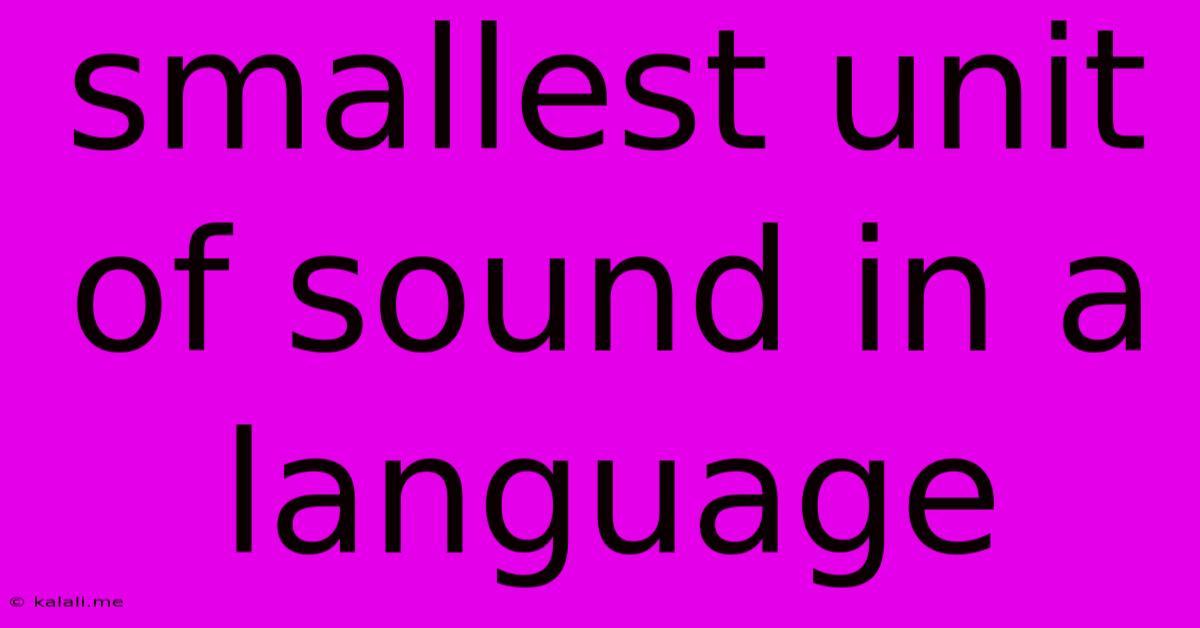Smallest Unit Of Sound In A Language
Kalali
Jun 16, 2025 · 3 min read

Table of Contents
Decoding Language: Understanding Phonemes, the Smallest Units of Sound
Have you ever wondered how we understand the nuances of spoken language? It's not just about the words themselves, but the intricate sounds that compose them. This article dives into the fascinating world of phonemes, the smallest units of sound in a language that distinguish one word from another. Understanding phonemes is crucial for linguistics, speech therapy, and even language learning.
What are Phonemes?
Phonemes are the fundamental building blocks of spoken language. They are abstract units, not the physical sounds themselves (which are called phones). What makes a phoneme distinct is its ability to change the meaning of a word. For instance, replacing the /p/ in "pat" with a /b/ creates "bat," demonstrating how a single phoneme shift alters meaning entirely. This is the key characteristic differentiating phonemes from other sounds. Think of them as the minimal pairs that create contrasting meanings.
Phonemes vs. Allophones: A Subtle Distinction
It's important to differentiate phonemes from allophones. Allophones are variations in the pronunciation of a phoneme that don't change the word's meaning. For example, the aspirated /p/ in "pin" and the unaspirated /p/ in "spin" are allophones of the same phoneme /p/. While they sound slightly different, they don't distinguish meaning. This subtle difference highlights the abstract nature of phonemes; they represent the underlying sound categories, not every single variation in pronunciation.
How Many Phonemes are There?
The number of phonemes varies significantly across languages. English, for example, boasts a relatively large inventory, typically cited as having between 38 and 44 phonemes, depending on the dialect and analysis method used. Other languages may have considerably fewer or more. This variance underlines the diversity and complexity of human communication. The differences aren’t just in quantity but also in the quality and types of sounds involved, adding to the richness of global linguistics.
The Importance of Phonemic Awareness
Understanding phonemes is key to phonemic awareness, a crucial skill in early literacy development. Phonemic awareness involves the ability to identify, isolate, and manipulate individual sounds in words. This skill is directly linked to reading and spelling proficiency. Children who possess strong phonemic awareness generally have an easier time learning to read and write, highlighting the importance of this foundational linguistic skill. Activities focusing on rhyming, segmenting sounds in words, and manipulating phonemes contribute significantly to developing this critical literacy skill.
Applications Beyond Literacy
The study of phonemes extends beyond early childhood education. It's invaluable in fields like:
- Speech Therapy: Identifying and correcting speech sound disorders often involves a detailed analysis of phonemic inventories and their production.
- Foreign Language Learning: Understanding the phoneme system of a target language is crucial for accurate pronunciation and comprehension.
- Linguistic Research: Phonemes are fundamental to linguistic analysis, providing insights into the structure and evolution of languages.
- Speech Recognition Technology: Accurate speech recognition systems rely heavily on the identification and classification of phonemes.
In conclusion, phonemes represent the fundamental units of sound that shape our spoken language. Understanding their role in language acquisition, literacy development, and various other fields is essential for appreciating the complex interplay of sound and meaning in human communication. Further exploration into this field reveals the fascinating intricacies of how we use sound to construct and understand the world around us.
Latest Posts
Latest Posts
-
Which Stage Of Mitosis Is The Longest
Jun 16, 2025
-
Which Of The Following Is True About Viruses
Jun 16, 2025
-
What Is The Difference Between Gmail And Email
Jun 16, 2025
-
What Is The Lcm Of 4 8 And 12
Jun 16, 2025
-
What Is The Colour Of Lymph
Jun 16, 2025
Related Post
Thank you for visiting our website which covers about Smallest Unit Of Sound In A Language . We hope the information provided has been useful to you. Feel free to contact us if you have any questions or need further assistance. See you next time and don't miss to bookmark.